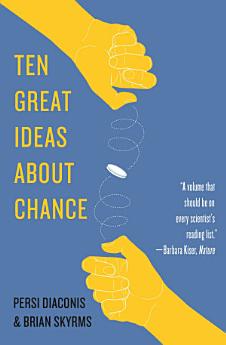Ten Great Ideas about Chance
ต.ค. 2017 · Princeton University Press
2.0star
2 รีวิวreport
eBook
272
หน้า
family_home
มีสิทธิ์
info
reportคะแนนและรีวิวไม่ได้รับการตรวจสอบยืนยัน ดูข้อมูลเพิ่มเติม
เกี่ยวกับ eBook เล่มนี้
A fascinating account of the breakthrough ideas that transformed probability and statistics
In the sixteenth and seventeenth centuries, gamblers and mathematicians transformed the idea of chance from a mystery into the discipline of probability, setting the stage for a series of breakthroughs that enabled or transformed innumerable fields, from gambling, mathematics, statistics, economics, and finance to physics and computer science. This book tells the story of ten great ideas about chance and the thinkers who developed them, tracing the philosophical implications of these ideas as well as their mathematical impact.
Persi Diaconis and Brian Skyrms begin with Gerolamo Cardano, a sixteenth-century physician, mathematician, and professional gambler who helped develop the idea that chance actually can be measured. They describe how later thinkers showed how the judgment of chance also can be measured, how frequency is related to chance, and how chance, judgment, and frequency could be unified. Diaconis and Skyrms explain how Thomas Bayes laid the foundation of modern statistics, and they explore David Hume’s problem of induction, Andrey Kolmogorov’s general mathematical framework for probability, the application of computability to chance, and why chance is essential to modern physics. A final idea—that we are psychologically predisposed to error when judging chance—is taken up through the work of Daniel Kahneman and Amos Tversky.
Complete with a brief probability refresher, Ten Great Ideas about Chance is certain to be a hit with anyone who wants to understand the secrets of probability and how they were discovered.
In the sixteenth and seventeenth centuries, gamblers and mathematicians transformed the idea of chance from a mystery into the discipline of probability, setting the stage for a series of breakthroughs that enabled or transformed innumerable fields, from gambling, mathematics, statistics, economics, and finance to physics and computer science. This book tells the story of ten great ideas about chance and the thinkers who developed them, tracing the philosophical implications of these ideas as well as their mathematical impact.
Persi Diaconis and Brian Skyrms begin with Gerolamo Cardano, a sixteenth-century physician, mathematician, and professional gambler who helped develop the idea that chance actually can be measured. They describe how later thinkers showed how the judgment of chance also can be measured, how frequency is related to chance, and how chance, judgment, and frequency could be unified. Diaconis and Skyrms explain how Thomas Bayes laid the foundation of modern statistics, and they explore David Hume’s problem of induction, Andrey Kolmogorov’s general mathematical framework for probability, the application of computability to chance, and why chance is essential to modern physics. A final idea—that we are psychologically predisposed to error when judging chance—is taken up through the work of Daniel Kahneman and Amos Tversky.
Complete with a brief probability refresher, Ten Great Ideas about Chance is certain to be a hit with anyone who wants to understand the secrets of probability and how they were discovered.
การให้คะแนนและรีวิว
2.0
2 รีวิว
เกี่ยวกับผู้แต่ง
Persi Diaconis is the Mary V. Sunseri Professor of Statistics and Mathematics at Stanford University and the coauthor of Magical Mathematics: The Mathematical Ideas That Animate Great Magic Tricks (Princeton). Brian Skyrms is Distinguished Professor in the Department of Logic and Philosophy at the University of California, Irvine, and Professor of Philosophy at Stanford University. His books include From Zeno to Arbitrage.
ให้คะแนน eBook นี้
แสดงความเห็นของคุณให้เรารับรู้
ข้อมูลในการอ่าน
สมาร์ทโฟนและแท็บเล็ต
ติดตั้งแอป Google Play Books สำหรับ Android และ iPad/iPhone แอปจะซิงค์โดยอัตโนมัติกับบัญชีของคุณ และช่วยให้คุณอ่านแบบออนไลน์หรือออฟไลน์ได้ทุกที่
แล็ปท็อปและคอมพิวเตอร์
คุณฟังหนังสือเสียงที่ซื้อจาก Google Play โดยใช้เว็บเบราว์เซอร์ในคอมพิวเตอร์ได้
eReader และอุปกรณ์อื่นๆ
หากต้องการอ่านบนอุปกรณ์ e-ink เช่น Kobo eReader คุณจะต้องดาวน์โหลดและโอนไฟล์ไปยังอุปกรณ์ของคุณ โปรดทำตามวิธีการอย่างละเอียดในศูนย์ช่วยเหลือเพื่อโอนไฟล์ไปยัง eReader ที่รองรับ




